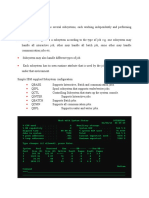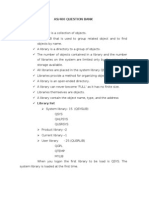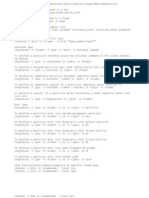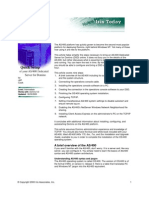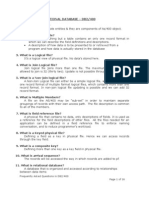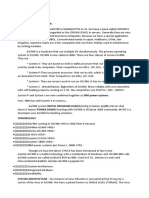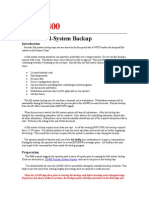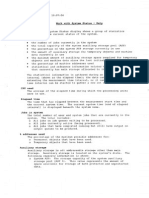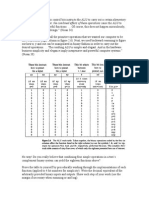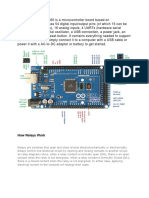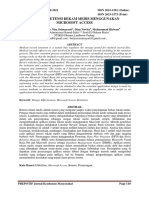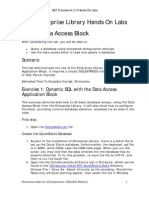AS/400 Command Quick Guide
IPL Procedures:
(Optional methods)
a. Security officer @ the AS/400 console "DSP01" / controlling subsystem
endsbs *all *immed
pwrdwnsys option(*immed) restart(*yes)
b. GO POWER
select option 3 - Power Down
c. Go to side panel
Change the status number to 03 - IPL, then press <enter>
Change status in Manual mode (M)
System Backup:
GO SAVE
select option 21 - Entire System.
Verify that you are using a device in the controlling subsystem:
WRKSYSVAL QCTLSBSD (QCTL) or (QBASE)
Network:
DSPNETA Display Network Attributes
WRKCFGSTS *LIN/*CTL/*DEV
VRYCFG NWSD
WRKOBJLCK (name of object ) *DEV
ETHLITCP00
JOB - QTCPIP
STRTCP, ENDTCP Start TCP/IP or End TCP/IP
WRKHDWRSC *CMN Work with Communications Resources
Work with TCP/IP Routes (*DFTROUTE) - Destination
Hardware:
WRKHDWRSC *PRC Work with Processor Resources
*STG Work with Storage Resources
WRKHDWPRD Work with hardware products
Messages:
DSPLOG (F4)
� DSPMSG MSGQ(*QSYSOPR) Display message Queue
Subsystem:
WRKSYSSTS - Work with System Status
(Wait at least 5 mins before using any of the values, pressing the refresh key, “PF5”)
a. % CPU used.
b. % System ASP used, system pool size.
Check not over 80%.
c. ACT – to – Wait value.
WRKSHRPOOL - Work with Shared Pools
WRKACTJOB - check if subsystem is active
endsbs name *IMMED
strsbs name
WRKSBS option 5. - Display Subsystem Description
1. Operational attributes
CPF1105 Maximum number of jobs (*NOMAX)
2. Pool definitions
4. Work station name entries
5. Work station type entries
7. Routing entries
Option 4 - Workstation name entries
Creating an entirely new subsystem description
You can create a subsystem description in two ways. You can copy an existing
subsystem description and change it, or you can create an entirely new description. The following
are two approaches you can use:
Copying an existing subsystem description
1. Create a duplicate object, CRTDUPOBJ, of an existing subsystem description. (You can
also use the
WRKOBJ or WRKOBJPDM commands.)
2. Change the copy of the subsystem description.
Creating an entirely new subsystem description
1. Create a subsystem description (CRTSBSD).
2. Create a job description (CRTJOBD).
3. Add work entries to the subsystem description.
a. ADDWSE (Add workstation entry) or RMVWSE
Tape Commands:
GO TAPE
� 1. Display tape information
2. Initialize a tape
DEV(TAP01) DENSITY(*FMT3490e or *QIC2GB) CHECK(*YES)
3. Print contents of a tape
4. Save
5. Restore
6. Work with tape device status
7. Verify tape
RSTOBJ name DEV(TAP01)
1. Create a Target Library
DUPTAP FROMDEV(TAPxx) TODEV(TAPxx)
Performance Monitor/400
PMREAD
CFGPM400
GO QMPGLIB/PM400
PM/400
Capacity planning and performance analysis tool called Performance Management/400
(PM/400) has been loaded on your system. PM/400 is a fully functional licensed product (LP)
and you received it free of charge.
Although PM/400 is now on your system, it is not yet activated. You can activate it through the
execution of one simple command. PM/400 is capturing non-proprietary system utilization
information from the performance monitor function of OS/400, the management of the collected
data, and then the transmitting of that data via phone line to your IBM Support Team. In return
you'll receive feedback from your Support Team via either capacity and performance "letters of
notification" or via capacity and performance reports. This feedback highlights when your current
CPU, memory, and DASD utilization trends will cause you to exceed the guidelines for good
performance.
Special
GO CLEANUP
RCLSTG (monthly) Reclaim Storage
WRKSPLF Work with Spool File
LPR command
WRKLICINF option 2 5769-XW1
Client Access 95/NT exceeded
WRKSYSVAL
WRKJOB JOB(IPPRT01)
PTF’s
SNDPTFORD
WRKPRB
� DSPPRB
Problem record:9730871850
Service Number: 53450
0. CALL QESPHONE Support Information Setup
1. WRKCNTINF Local & IBM Support contact information
2. SNDSRVRQS *TEST Test IBM support dial facility
STRSST Start System Service Tools
Programming Development Manager (PDM)
STRPDM (option 3 -members)
Source file - QCLSRC
Library -
Member - startup TYPE CLP
Compile option (14) press F4


